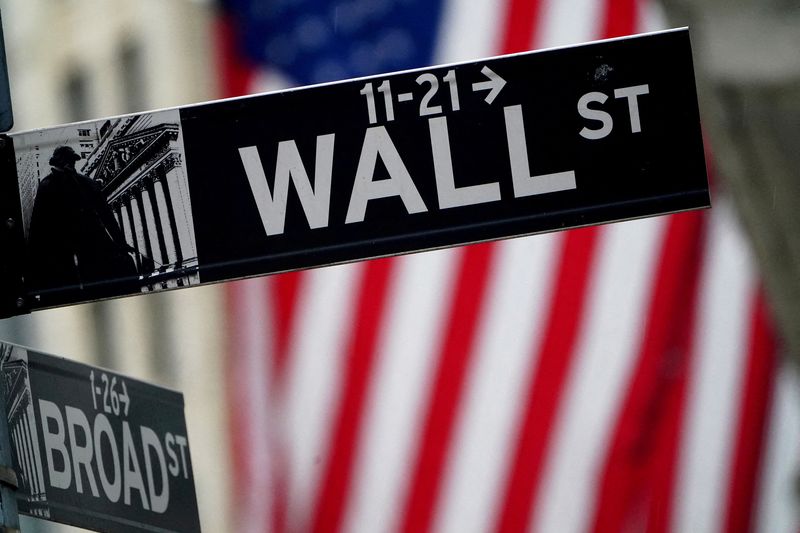Take Five: The second half
2022.07.01 12:55

FILE PHOTO: A Wall Street sign outside the New York Stock Exchange in New York City, New York, U.S., October 2, 2020. REUTERS/Carlo Allegri//File Photo/File Photo
(Reuters) – After a torrid six months, world markets will be hoping for some sign that central banks might dial back their hawkishness. U.S. jobs data, if sharply below forecast, might prove that catalyst.
Central banks are front and centre elsewhere, too. The ECB kicks off its bond reinvestment scheme to shield southern Europe’s fragile economies; emerging markets’ policy-tightening spree will continue; and in Australia, a half-point rate rise is expected.
Here is your look at the week ahead in markets from Karin Strohecker and Sujata Rao in London, Ira Iosebashvili in New York and Kevin Buckland in Tokyo.
1/NORTH TO SOUTH
Starting July 1, the European Central Bank is to use proceeds from maturing German, French and Dutch debt to buy bonds from Italy and other southern states.
The aim is to prevent their borrowing costs from rising too much compared to richer peers– so-called fragmentation.
So far so good. Expectations of ECB support helped lower Italy’s 10-year borrowing costs by 100 bps since mid-June, while its yield premium over Germany is just above 200 bps, tumbling from a perceived 250 bps danger line hit two weeks ago.
It’s hard to say how long the feel-good effect will last; Citi analysts say the spread-tightening is overdone, and markets have priced already 50 billion euros in bond reinvestments. The test starts now. (Graphic: Italy yield, https://fingfx.thomsonreuters.com/gfx/mkt/zgpomddalpd/Pasted%20image%201656665160199.png)
2/PAY DAY
U.S. data have recently provided more than their fair share of nasty surprises in a sign the Federal Reserve’s 150 bps in rate hikes are seeping through the economy.
But with no let-up in inflation, the Fed is on autopilot with rate rises. Friday will show how the other leg of the Fed’s inflation/employment mandate is performing.
Analysts expect 295,000 jobs U.S. jobs were added in June; a figure significantly below that could bolster the argument for smaller or slower rate hikes, following the most recent 75 bps move.
Traders have dialled down bets on where rates might peak, enabling a tentative equity rally. So, for some on Wall Street, a weaker jobs print may end up being good news. (Graphic: FED AND STOCKS, https://fingfx.thomsonreuters.com/gfx/mkt/lgpdwbewovo/Pasted%20image%201656539445533.png)
3/WIZARD OF OZ
Reserve Bank of Australia Governor Philip Lowe says the choice at Thursday’s policy meeting is between a quarter-point rate hike or a half-point one. But markets are not buying it.
Instead they expect Lowe to pull a 50 bps increase out of the hat, and see rates at 1.5% by August from the current 0.85%.
And why not, after getting stung by a shock half-point hike last month, rather than the 25 bps that was expected.
A weak Aussie dollar that is boosting imported inflation is contributing to those bets. And remember, Lowe has a track record of talking down rate hike risks, only to capitulate later. With inflation at two-decade peaks, traders are betting on more of the same. (Graphic: Data surprises have driven hawkish Aussie rates bets, https://fingfx.thomsonreuters.com/gfx/mkt/zdpxogwedvx/Pasted%20image%201651821916831.png)
4/RATES IN EASTERN EUROPE
This year has tempered a long-held view that EU nations such as Poland and Hungary are part of a lucky fringe within emerging markets. In fact, regional policymakers are under immense pressure from double-digit inflation, risks from the Russia-Ukraine conflict and crashing currencies.
Hungary’s central bank has just jacked up rates by 175 bps – more than three times what was expected – illustrating the painful price pressures. The forint, nevertheless, languishes near record lows against the euro
Romania is expected to hike rates by 75 bps to 4.5% on Wednesday, while Poland’s central bank could up its current 6% interest rate by 100 bps at its Thursday meeting. Serbia, too. is seen lifting its 2.5% benchmark rate.
Nor is inflation the only problem: Ratings agency Fitch warns that the Czech Republic, Hungary and Slovakia are among the most vulnerable to a Russian gas supply cut-off. (Graphic: Inflation in emerging Europe, https://fingfx.thomsonreuters.com/gfx/mkt/klpykrrdxpg/CEE%20inflation.PNG)
5/RELIEF FROM CRACKDOWN AND LOCKDOWN
For all the angst over Chinese capital outflows, MSCI’s China stock index ended the first half of 2022 down 12%, comparing favourably with the S&P 500‘s 20% fall.
One reason was a June bounce, driven by the easing of COVID lockdowns. With officials pledging support for markets and the economy, and easing their tech sector crackdowns, investment banks are again rushing to slap Buy labels on Chinese shares.
There are headwinds, including the possibility of Western sanctions down the road and more property sector defaults. Long-awaited policy easing may be slow in coming, given the rest of the world is in rate-hike mode.
Still, with Western and emerging market stocks reeling from rate hikes and inflation, China may be in for an upbeat H2.. (Graphic: Foreign flows into Chinese stocks via Stock Connect Foreign flows into Chinese stocks via Stock Connect, https://graphics.reuters.com/GLOBAL-MARKETS/jnvwezddnvw/chart.png)








